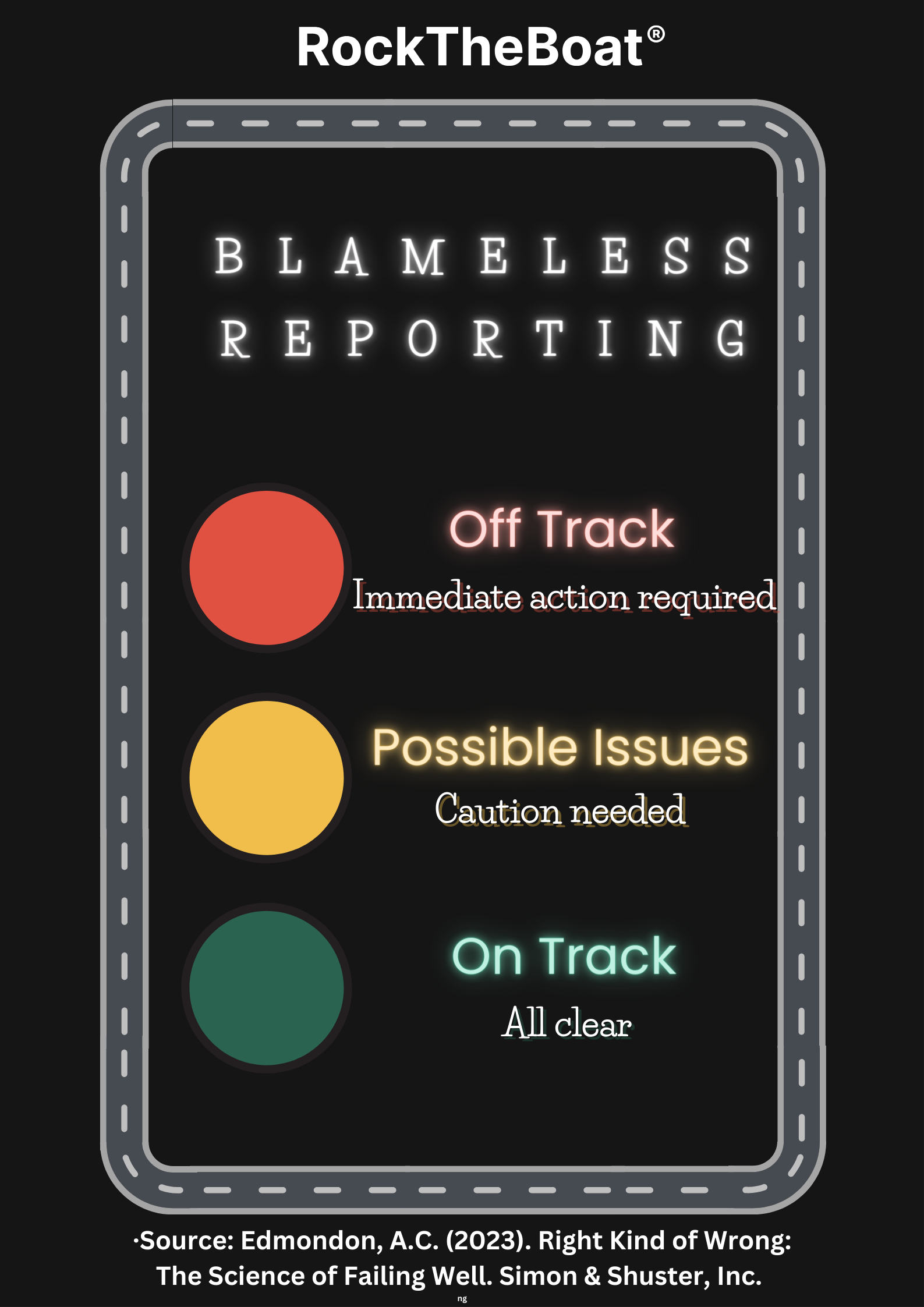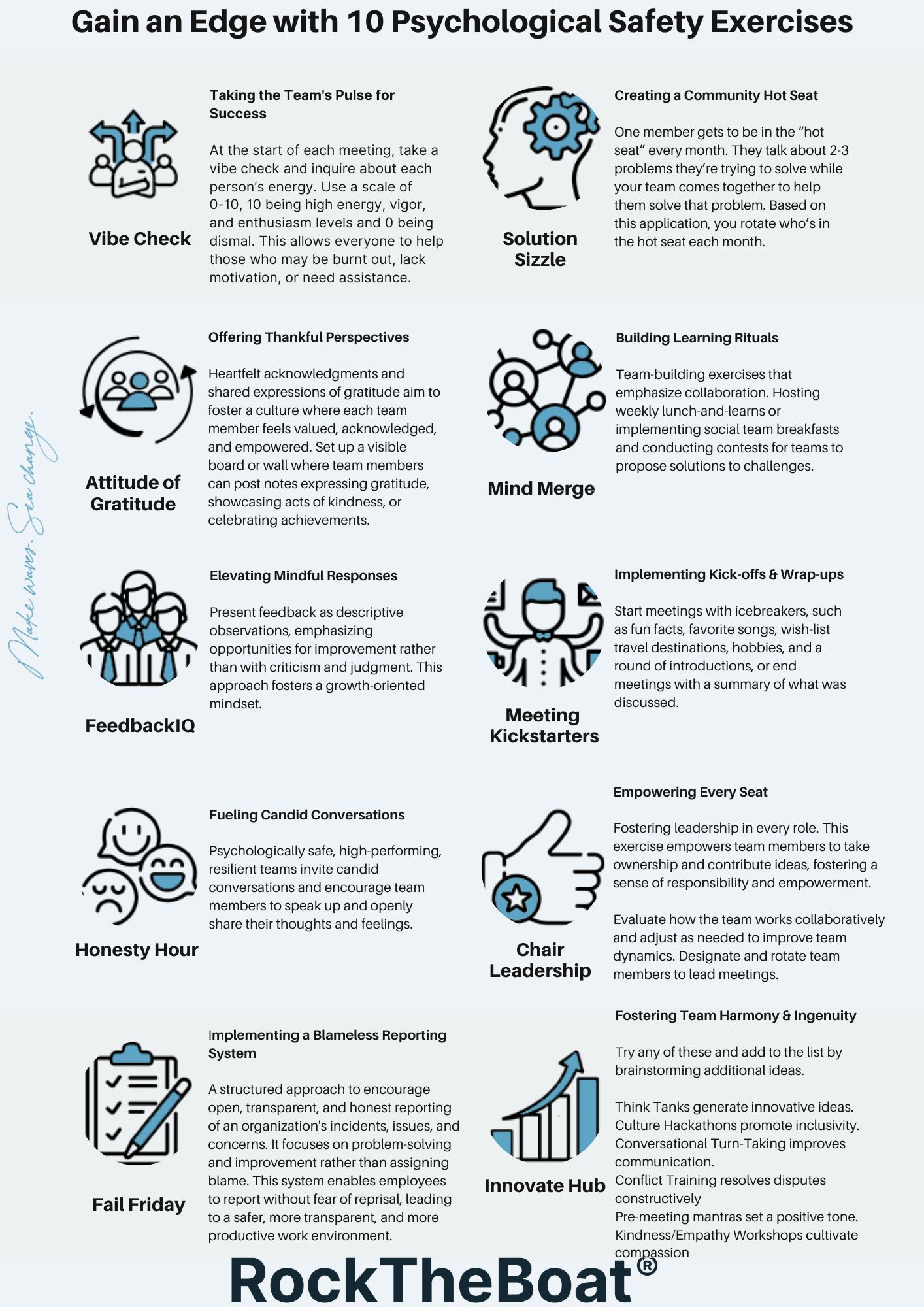Gain an Edge with 10 Psychological Safety Exercises
Gain an Edge with 10 Psychological Safety Exercises designed to empower teams, cultivate trust, nurture a learning culture, and foster open and honest communication. From ‘Vibe Check’ and ‘Attitude of Gratitude’ to ‘FeedbackIQ’ and ‘Honesty Hour,’ each exercise strengthens the foundation of trust, candor, and openness within teams. As we delve into ‘Fail Friday‘ to celebrate mistakes and ‘Solution Sizzle’ to spark innovation, explore ‘Mind Merge’ sessions fostering collaboration, and embrace ‘Meeting Kickstarters’ to set the tone, these exercises become the catalysts for a psychologically safe culture where every chair holds a leader, and each idea is encouraged.
1. Vibe Check:
Taking the Team’s Pulse for Success
At the start of each meeting, take a vibe check and inquire about each person’s energy. Use a scale of 0-10, 10 being high energy, vigor, and enthusiasm levels and 0 being dismal. This allows everyone to help those who may be burnt out, lack motivation, or need assistance.
2. Attitude of Gratitude:
Offering Thankful Perspectives
Heartfelt acknowledgments and shared expressions of gratitude aim to foster a culture where each team member feels valued, acknowledged, and empowered. Set up a visible board or wall where team members can post notes expressing gratitude, showcasing acts of kindness, or celebrating achievements.
3. FeedbackIQ:
Elevating Mindful Responses
Present feedback as descriptive observations, emphasizing opportunities for improvement rather than with criticism and judgment. This approach fosters a growth-oriented mindset.
4. Honesty Hour:
Fueling Candid Conversations
Psychologically safe, high-performing, resilient teams invite candid conversations and encourage team members to speak up and openly share their thoughts and feelings.
5. Fail Friday:
Implementing a Blameless Reporting System
Encourage permission to learn through accepted risk, mistakes, and failure. In a safe environment, failure is not stigmatized, nor are people pointing fingers; mistakes and errors are managed effectively to achieve learning. In this environment, leaders help employees see mistakes through curiosity, openness, patience, and transparency, sparking a desire to change the behavior that led to that failure yet resisting judgment and criticism. Only by failing forward can one achieve excellence.
Edmondson’s blameless reporting system is a structured approach to encourage open, transparent, and honest reporting of an organization’s incidents, issues, and concerns. It focuses on problem-solving and improvement rather than assigning blame. This system enables employees to report without fear of reprisal, leading to a safer, more transparent, and more productive work environment.
6. Solution Sizzle:
Creating a Community Hot Seat
One member gets to be in the “hot seat” every month. They talk about 2-3 problems they’re trying to solve while your team comes together to help them solve that problem. Based on this application, you rotate who’s in the hot seat each month.
7. Mind Merge: Building Learning Rituals
Team-building exercises that emphasize collaboration.
Hosting weekly lunch-and-learns or implementing social team breakfasts and conducting contests for teams to propose solutions to challenges.
8. Meeting Kickstarters:
Implementing Kick-offs & Wrap-ups
Start meetings with icebreakers, such as fun facts, favorite songs, wish-list travel destinations, hobbies, and a round of introductions, or end meetings with a summary of what was discussed.
9. Chair Leadership:
Empowering Every Seat
Fostering leadership in every role. This exercise empowers team members to take ownership and contribute ideas, enabling a sense of responsibility and empowerment.
Evaluate how the team works collaboratively and adjust as needed to improve team dynamics. Designate and rotate team members to lead meetings.
10. Innovate Hub:
Fostering Team Harmony & Ingenuity
Creating forums or platforms for idea-sharing and innovation. These spaces encourage diverse viewpoints, inviting everyone to contribute and feel valued.
Try any of these and add to the list by brainstorming additional ideas.
- Think Tanks generate innovative ideas.
- Culture Hackathons promote inclusivity.
- Conversational Turn-Taking improves communication.
- Conflict Training resolves disputes constructively
- Pre-meeting mantras set a positive tone.
- Kindness/Empathy Workshops cultivate compassion.
Conclusion:
Sewing psychological safety into an organization’s fabric requires rituals, the heartbeat of an organization, that facilitate ongoing safe environments. Rituals are prescribed practices and exercises that set standard behaviors and expectations. Leaders can ritualize safe environments and gain an edge with these 10 Psychological Safety Exercises.
Psychological safe teams experience better employee engagement, embrace experimentation, foster more creative, productive, and satisfied employees, have better team communication and collaboration, retain talent, provide an inclusive interpersonal climate for problem-solving and decision-making, and build resiliency to take risks, learn, and grow.
Recommended Reading
Meet Jodie, your Culture & Transformation Captain. With over twenty years helping people change, facilitating team discussions, building cultures, designing, implementing and teaching classes, your organization is in good hands.





